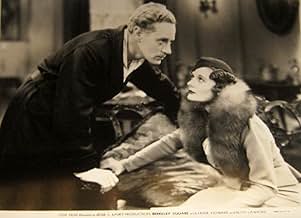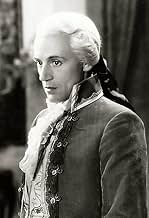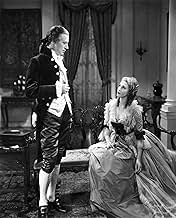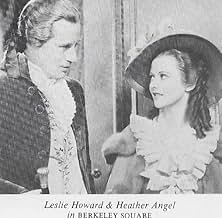Adicionar um enredo no seu idiomaA young American man comes to believe that he can will himself back to London in the time of the American Revolution and meet his ancestors, who lived in the house he has just inherited.A young American man comes to believe that he can will himself back to London in the time of the American Revolution and meet his ancestors, who lived in the house he has just inherited.A young American man comes to believe that he can will himself back to London in the time of the American Revolution and meet his ancestors, who lived in the house he has just inherited.
- Direção
- Roteiristas
- Artistas
- Indicado a 1 Oscar
- 4 vitórias e 2 indicações no total
- The American Ambassador
- (as Samuel Hinds)
- Innkeeper
- (não creditado)
- Town Crier
- (não creditado)
- Maid
- (não creditado)
Avaliações em destaque
On a stormy night in 1784, new American noble Leslie Howard (as Peter Standish) arrives in London's "Berkeley Square" to seek a distant cousin's hand in marriage. After exiting his coach, Mr. Howard seems to vanish. Meanwhile, in the present (1933), his direct descendant and namesake "Peter Standish" (Howard, in a dual role) has inherited the same house. The modern Howard troubles his fiancée and friends due to his preoccupation with the past, especially the September 1784 day when his namesake arrived. Transported to the past, Howard invites suspicion when his "modern" manners and knowledge surface. Howard talks too much. More significantly, he becomes attracted to the wrong woman, beautiful but melancholy Heather Angel (as Helen Pettigrew)...
This intriguing "time travel" film was unavailable for decades, but the story was revived often on stage and screen. It was based on an unfinished Henry James novel and inspired memorable imitations from horror mythos-makers H. P. Lovecraft ("The Shadow out of Time") and Dan Curtis ("Dark Shadows"). Howard recreates his performance from the stage well, but director Frank Lloyd and Fox don't take full advantage of cinema potential. Early examples are Howard's trip to the past. He could have appeared outside the door, wet, as both arrivals occurred in the rain. Howard also immediately knows how to sit in his 1784 costume, betraying a familiar comfort. Later, the film would have benefited from Howard visiting the actual grave mentioned in a letter...
Solid impressions are made by lustful Colin Keith-Johnston (as Thomas "Tom" Pettigrew) and sensible sister Valerie Taylor (as Kate). Matriarchal Irene Browne (as Ann) played her role again in the 1941 re-make starring Tyrone Power.
******* Berkeley Square (9/15/33) Frank Lloyd ~ Leslie Howard, Heather Angel, Colin Keith-Johnston, Valerie Taylor
It is currently not commercially available, but a number of vendors have poor quality CDs or tapes for sale. All of these were probably made from a VHS tape from a TV showing. The tape was deteriorated and possibly copied several times so there is a lot of instability and wiggling of the image. The original broadcast used extreme compression of the video and sound. As a result the noise level rises to become very loud until dialog causes the gain to be cut. As a result the dialog is sometimes very indistinct. The music which was originally soft also rises to match the level of the dialog. Once this is restored by hand, the film is fairly listenable. The complaint of another reviewer about the music being too loud may stem from watching a copy with similarly compressed sound. In addition the broadcast severely cropped the film and did not stabilize the jitter.
This is a film that deserves restoration from the existing prints, but when and if this happens is unknown. Until then buying one of the existing CDs may be the only way to view this fine film.
A thunder storm serves as the device that transports Howard from 1933 back to 1784, and in the same Berkeley Square house he would one day inherit. Posing as the recently-arrived American cousin his hosts were expecting, Howard frightens those in his presence by the ability to predict the future, and by his odd phrases. They think he's the devil. But Heather Angel's character, the sister of the woman Howard was slated to marry, sees the truth.
Berkeley Square has a lovely staginess to it, and the air of a drawing room comedy of manners, with sumptuous period costumes. (The film is based on a play by the same name). Howard and Angel capture the loneliness and despair of lovers trapped in different worlds. Historical figures like the painter Sir Joshua Reynolds, and Georgina the Duchess of Devonshire make appearances.
There's a scene in which Angel stares into Howard's eyes, and sees the future: the great Industrial Revolution, with automobiles, trains, airplanes, electricity, tall buildings. She also sees war and destruction. And rather than being in awe of the modern world, she's horrified that God would condemn mankind to such a monstrous future. It's quite prescient. If someone back in 1933 could have had a peak into the future they, like Heather Angel's character, would probably look past the digital gadgets and be horrified, too.
He gives a very forceful performance here as a young man who is fascinated by his ancestry and somehow transports himself to an earlier era, with unhappy consequences he couldn't have expected when events turn against him.
Heather Angel makes a good impression (she and Howard both starred in the Broadway stage version), but the tale itself is much too talky for the screen and would have benefited from a wider use of outdoor scenes to take away some of the stage-bound feeling. An unusual feature is the almost constant flow of background music in an era when most soundtracks were only punctuated by dialog without musical effects. This affects the quality of the spoken words, of which there are far too many for my taste and, in this case, because it's based on a stage play taken from an unfinished Henry James novel called "A Sense of Time." It takes a willingness to suspend disbelief in order to enjoy the fantasy aspects of the story, but it's done in an interesting way and directed in stylish fashion by Frank Lloyd.
Summing up: One of Howard's better film performances, he was nominated for a Best Actor Oscar. Remade by Fox in 1951 as a film for Tyrone Power and Ann Blyth called "I'll Never Forget You."
Right off the bat, he gets into trouble fitting into the rhythm and manners of 18th Century London ... and into the lives of his ancestors. The mother (Irene Browne) is trying to marry off two daughters (Heather Angel, Valerie Taylor) to men with money, one of whom is Howard's ancestor whose body he is now inhabiting.
Knowing that he must not change history, he walks a tightrope. He is not attracted to the woman his ancestor marries, but he is attracted to her sister. But history dictates he must not marry her. He also keeps dropping words and phrases that make no sense in 1784, and he scares people by when he blurts out bits of information about things that have not yet happened.
As he digs himself into a bigger hole every day, he realizes that the woman he really loves (Angel) seems to shares his discontent for the age in which she is trapped. She longs for the future! Yet in one horrific moment, she sees the future world in his eyes and it scares her. For his part, he finally has to admit that the 18th Century is utterly horrible and that it actually stinks! People don't bathe; the streets are full of horse manure.
Leslie Howard is superb as the man torn between the past and his own time. He and Heather Angel make for a terrifically doomed couple, and the scene when he returns (in 1933) from her grave and read the epitaph carved into her headstone is quite moving.
Co-stars include Juliette Compton as an arch and wily duchess, Alan Mowbray as Clinton, Ferdinand Gottschalk as the aged suitor, Betty Lawford as the current-day girlfriend, Beryl Mercer as the housekeeper, and Samuel S. Hinds as Adams.
Você sabia?
- CuriosidadesS.T. Joshi points to this film as an inspiration for H.P. Lovecraft's novel "The Shadow Out of Time": "Lovecraft saw this film four times in late 1933; its portrayal of a man of the 20th century who somehow merges his personality with that of his 18th-century ancestor was clearly something that fired Lovecraft's imagination, since he had written a story on this very theme himself--the then unpublished "The Case of Charles Dexter Ward" (1927)." Lovecraft called the film "the most weirdly perfect embodiment of my own moods and pseudo-memories that I have ever seen--for all my life I have felt as if I might wake up out of this dream of an idiotic Victorian age and insane jazz age into the sane reality of 1760 or 1770 or 1780." Lovecraft noted some conceptual problems in this film's depiction of time travel, and felt that he had "eliminated these flaws in his masterful novella of mind-exchange over time."
- Erros de gravaçãoThe word Okay (OK) was not used in the 18th century.
- Citações
Peter Standish: A new Fire of London, that's what's needed here. Yes, and a new Plague too. Dirt, disease, cruelty, smells - Lord, how the eighteenth century stinks!
- ConexõesReferenced in Don't Bet on Blondes (1935)
- Trilhas sonorasEarly One Morning
(uncredited)
English folk song
Principais escolhas
- How long is Berkeley Square?Fornecido pela Alexa
Detalhes
- Tempo de duração1 hora 28 minutos
- Cor
- Proporção
- 1.37 : 1
Contribua para esta página
































